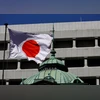By River Akira Davis & Kiuko Notoya
For years, mortgages in Japan have been nearly cost free. Homeowners are now bracing for that to change.
Japan’s central bank had maintained benchmark interest rates near zero since the mid-1990s. As a result, many home buyers have gotten used to paying between 0.3 and 0.4 per cent for floating-rate mortgages, or just over 1 percent for longer-term, fixed-rate ones.
Homeowners in the United States, where rates currently hover around 6.5 percent, “would likely be shocked to see rates like these,” said Takashi Shiozawa, an executive at MFS, which operates a popular Japanese mortgage comparison website. “It is basically as if they are free.”
But Japan’s central bank has announced an end to the era of zero interest rates. The Bank of Japan bumped up rates in March and July, and has indicated it plans to keep going.
Unlike in the United States, where mortgage rates are typically fixed for 30 years, most home loans in Japan have variable rates that fluctuate with the benchmark. Analysts predict the rates will reach 1 percent within the next two years and then rise further. For some Japanese homeowners, that would mean a substantial increase in monthly payments.
As a result, households are expected to find ways to cut back on other spending — a shift that could be a drag on Japan’s economy, which has already faltered over the past year because of weak household spending.
The prospect of rising interest rates is troubling homeowners, Mr. Shiozawa said. “It has been almost 20 years since we have experienced a rate hike, so it is causing a commotion,” he said.
More From This Section
The Bank of Japan’s decision to increase rates this year for the first time in 17 years was based partly on the belief that consumers could handle the hit to things like their mortgages, given that many of Japan’s large companies had recently provided big salary bumps.
Some experts are not so sure. Japan’s economy grew 0.8 per cent in the April-to-June quarter, driven by a rebound in consumption, but this followed a long period of weak spending when wage growth lagged behind inflation.
Older homeowners may have savings to draw on to cushion against higher interest rates. “Those who will suffer are younger families with mortgages,” said Stefan Angrick, a senior economist at Moody’s Analytics in Tokyo.
“People say it’s just a small increase, but Japan has had very little growth — very little inflation — for decades,” he said. “It’s an entire economy that operates on a scale of small numbers.”
Indeed, some homeowners say that super-low rates were the primary reason they chose to purchase property
in Japan.
Larry Kelly, an American working as an English teacher in Tokyo, said the 1.25 percent rate he had secured on a 34-year fixed-rate loan from a Japanese bank led him to stop renting and buy a home seven years ago, when he was 38.
Today, he pays about $450 a month for his three-bedroom home in western Tokyo.
When Kelly told relatives in the United States about his home purchase, he noted, they jokingly suggested that he had secretly become very wealthy after moving to Japan. “No, you don’t have to be rich to buy a home here,” Mr. Kelly recalls telling them.
While there have not been signs that rising rates have prompted a big decline in new home purchases, Japanese homeowners are beginning to become unsettled.
In 2022, when the central bank announced that it would adjust its policies to allow long-term rates to rise, the mortgage comparison website Moge Check crashed because of a surge in traffic.
Shiozawa, whose company runs Moge Check, said engineers had since increased the capacity of the site’s computer servers.
Traffic to Moge Check’s site doubled on July 31, when the Bank of Japan raised interest rates. Shiozawa said he had received an influx of inquiries from mortgage holders concerned about how the bank’s decision would affect their rates. Generally, Japanese people have a strong dislike of loans, he said. Some of that aversion has been passed down to younger home buyers by older generations who remember when rates were a lot higher.
©2024 The New York Times News Service
)